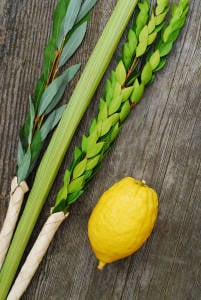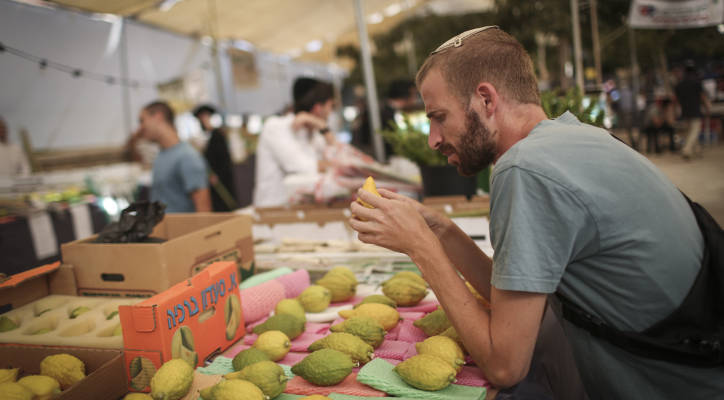
The four species. (Shutterstock)
Unless consumers on the international market step in, farmers in Israel stand to lose over 50 percent in profits from the annual sale of the four species used for ritual purposes during the holidays.
In advance of the upcoming Sukkot holiday season, Israeli distributors of the four species are predicting that the shmita (sabbatical) year will take a very heavy toll on their sales. This is despite well-known and commonly accepted adjudications of Jewish law that allow for the purchase of Israeli-grown produce.
Despite the religious mandate which requires that farming be curbed during this year, leading religious authorities approve specific measures to allow for the purchase of four species grown in the holy land and in so doing ensure that consumers help limit the economic damage to the growers and distributors and the Israeli economy as a whole. Like all produce grown in the shmita, the sale of four species is supervised by a rabbinic court which ensures that the sale takes place outside of the restrictions of the shmita year – a process known as Otzar Beit Din. The Eretz Chemda Institute in Jerusalem issued a specific ruling detailing the halachot (Jewish laws) permitting and even encouraging the purchase of Israeli-grown produce in the shmita year.
According to statistics from Israel’s Ministry of Agriculture, in recent years, some 350,000 sets of the lulav (date-palm frond), etrog (citron), hadas (myrtle) and arava (willow) branch sets were shipped internationally. The largest consumer outside of Israel is the US market with some 290,000 sets sold and an additional 60,000 in other parts of the world. With limitations placed on agricultural growth during the shmita year – the seventh year of the Jewish agrarian cycle which calls for the land to lie fallow – many consumers choose not to buy Israeli-grown products leading to what analysts described as a more than50 percent drop in the four species market.
The greatest beneficiary of this decrease in Israeli sales are etrog growers in Morocco who capitalize substantially on the shmita year with some 2,500 etrog trees planted in recent years in preparation for this year’s sale.
Steve Berger, who lives in Los Angeles and is president of MyIsraelConnection.com, a company known for a diverse suite of services designed to promote a connection with Israel, has become a leading distributor of the four species and is encouraging clients not to forego Israel in this shmita year. “Shmita is a beautiful and ancient ideal which is at the heart of Jewish tradition,” Berger says. “But it is not designed to create a situation where Jewish consumers are hurting the Israeli economy and favoring the coffers of Moroccan farmers. Rather, we need to ensure that people continue to buy from Israeli farmers and distributors.”
Berger’s partner Mickey Katzburg, who supervises the Israeli distribution of the four species for MyIsraelConnection.com, warns that the damage to the Israeli four species market will extend far past this year if too many consumers turn their backs on Israel. “If too much of the sales of etrogim go to Morocco, the farmers there will be able to develop a farming infrastructure at a faster and more competitive rate than their Israeli competitors and slowly take bigger and bigger pieces of the market in the coming years,” Katzburg says.
It should be noted that the major issue in relation to shmita comes from the growth of the etrog. The lulav can be harvested from Israeli trees even during shmita and a sizable portion of the lulav market has already been irreversibly lost to palm growers in northern Egypt. Many authorities on Jewish law also allow the myrtle branches to be harvested during shmita while the willows for foreign customers are almost always produced locally because they are too delicate to survive overseas shipping.
“Our objective is to remind our customers that they have the ability to limit the economic damage that this holiday season could present to the Israeli growers for whom the sale of etrogim is their very livelihood,” Berger says. “This can be fully accomplished within the spirit of the shmita year and there is no disputing that there will be a reduction in the crop this year in recognition of this ancient and blessed law. But when [Jewish law] gives us the option to support our Israeli farmers and the nation’s economy, we need to be sure that we do everything in our power to do so.”
Edited by: United with Israel
